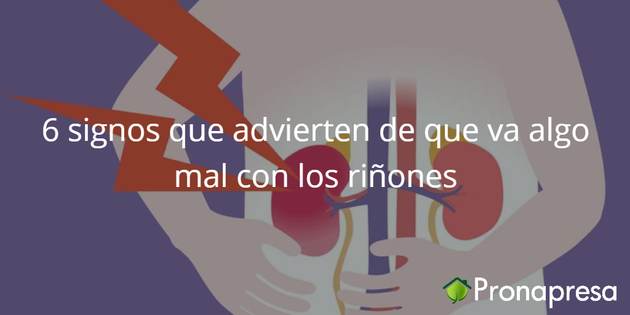Everyone has two kidneys, each about the size of a fist. These important organs fulfill a fundamental function, being responsible for filtering waste from the blood and removing excess fluids to produce urine.
In addition, they play a primary role in regulating blood pressure and are responsible for producing some of the hormones that the body requires to function in optimal condition. Knowing that they have to fulfill such important tasks, it is not surprising that some type of anomaly in them can reduce the general quality of life.
The main problem is that many of the symptoms that warn of kidney disease appear when it is already too advanced and difficult to control. Taking into account that an early diagnosis can save the lives of those who suffer from this type of pathology, for some time now some signs have been known that could be decisive for its detection.
1. Changes in urination
The kidneys are responsible for producing urine and that is why it is not surprising that changes in it are a first warning sign of a disease. Firstly, urination habits may change, making it necessary to go to the bathroom more times than usual, especially at night. An urge to urinate may also occur, but when you get to the bathroom the liquid expelled is minimal or none, while at the same time feeling a tightness in the lower pelvic part.
Urine can reveal signs such as:
* A paler or darker color.
* Strong smell.
* More foamy or bubbly.
* Presence of blood.
2. Fluid retention
Due to the difficulty these organs have in working when they are sick, fluids are retained in the body's tissues and cause inflammation in areas such as:
* The ankles.
* The legs.
* The face.
* Hands.
Due to this disorder, it is also common to feel an annoying sensation of abdominal heaviness and bloating more frequently.
3. Itchy sensation
Toxins present in the bloodstream are eliminated through the kidneys.
As there are problems in carrying out this function normally, the person may begin to suffer from skin rashes and an annoying itching or tingling sensation, which even extends to the muscles and bones.
4. Fatigue
One of the kidney functions is to produce a hormone known as erythropoietin. This has the job of supporting the body in the production of red blood cells, essential for transporting oxygen through the bloodstream.
As some type of failure or insufficiency occurs, there is also a decrease in hormonal production, so the muscles and mind tire more easily.
As energy levels decrease, affected people feel without the strength to do their daily activities, they sleep more than they should and feel weak all the time.
This condition is also known as anemia and another of its causes is iron deficiency.
5. Changes in taste perception and bad breath
The accumulation of waste in the blood causes the perception of the taste of food to be different.
In fact, some people experience a metallic taste, especially when eating meat. In addition, most have some degree of bad breath, which is very difficult to eliminate.
Many of those who feel this symptom stop eating because they find the taste of the food they eat very unpleasant.
6. Back pain
Back pain is so common that many people blame it on poor posture, overexertion or stress.
However, the possibility of a kidney problem should not be ruled out, especially if it occurs in the lower part or on one side.
When to be alerted?
All of these symptoms should be a reason for medical consultation, regardless of their origin. To turn on the warning signs about a possible kidney problem, it is essential to consider the risk factors you have, as well as the recurrence of these symptoms.
If two or more of them come and go frequently, or do not go away despite giving them other treatments, it is best to ask for a medical evaluation.
PRONAPRESA
"Because prevention is better than cure"






















































